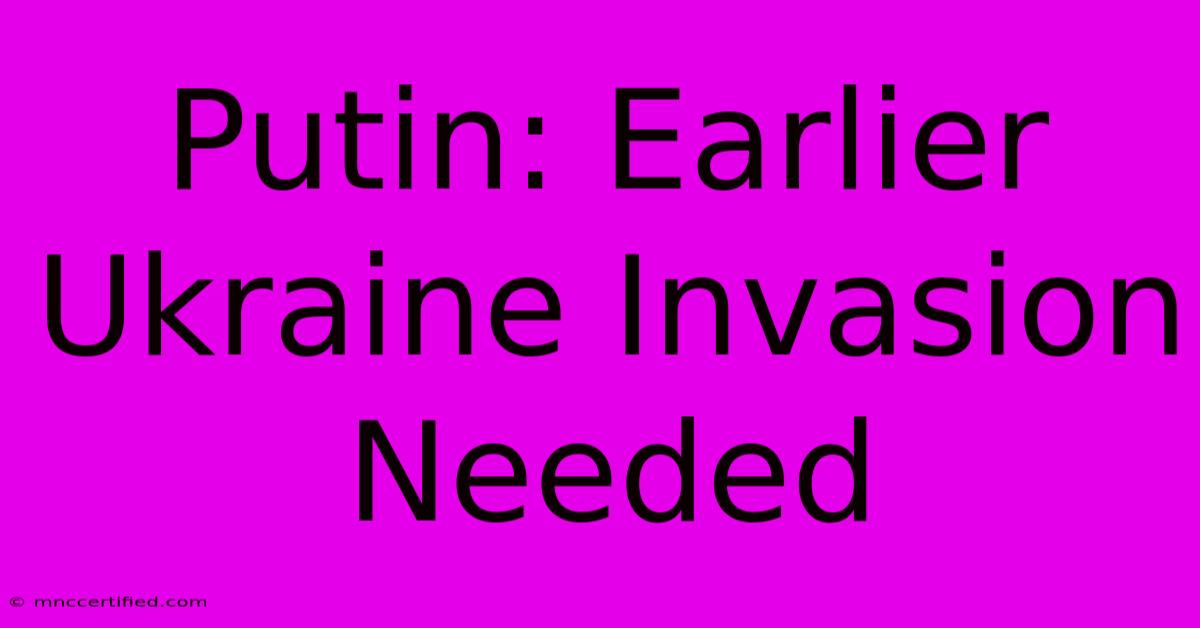Putin: Earlier Ukraine Invasion Needed

Table of Contents
Putin: Was an Earlier Ukraine Invasion Necessary? A Retrospective Analysis
Vladimir Putin's decision to invade Ukraine in February 2022 sent shockwaves across the globe. However, some analysts have speculated whether a preemptive strike, perhaps years earlier, would have yielded different results for Russia. This article explores this controversial "what if" scenario, examining the potential benefits, drawbacks, and ultimately, the impossibility of judging such a hypothetical decision without significant historical revisionism.
The Argument for Earlier Action: A Proactive Approach
Proponents of an earlier invasion often point to what they perceive as a missed opportunity for Russia. Their arguments often center around these points:
-
Weakening Ukrainian Resistance: An earlier invasion, potentially before Ukraine’s military reforms and Western support solidified, might have met with less resistance. This could have led to a quicker, less costly, and perhaps less bloody conquest. This argument hinges on the assumption that Ukraine's capacity for resistance would have been significantly weaker at an earlier point.
-
Preventing NATO Expansion: Russia's stated concerns about NATO expansion have long been a key justification for its actions. An earlier invasion, they argue, might have preempted further NATO expansion eastward, a development Moscow views as a direct threat to its security interests. This line of reasoning assumes a direct causal link between Ukrainian sovereignty and NATO expansion, a connection that remains debated among experts.
-
Internal Instability: Some speculate that an earlier invasion could have exploited potential internal weaknesses within Ukraine, perhaps capitalizing on political instability or societal divisions. This argument is highly speculative, relying on assumptions about internal dynamics that may not have been accurately predictable.
The Case Against: Risks and Repercussions
The counterarguments to an earlier invasion are numerous and weighty:
-
International Condemnation: An earlier invasion would have almost certainly faced even stronger international condemnation than the 2022 invasion. This could have led to far more extensive and crippling sanctions, potentially crippling the Russian economy more severely earlier in the process.
-
Increased Western Support for Ukraine: A preemptive strike would have likely galvanized greater Western support for Ukraine, both militarily and economically, far earlier than seen in 2022. This could have made the conflict even more protracted and costly for Russia.
-
Domestic Instability in Russia: Launching a large-scale military operation years earlier could have exposed Russia's own vulnerabilities and potentially destabilized the domestic political landscape.
-
Unpredictability of Outcomes: Military engagements are notoriously unpredictable. The very nature of warfare means that even the most meticulously planned operations can go awry. An earlier invasion could have easily resulted in a protracted, bloody conflict far more devastating than what we have witnessed.
The Unanswerable Question: Hindsight and Historical Revisionism
Ultimately, the question of whether an earlier invasion would have been "necessary" or "beneficial" for Russia is fundamentally unanswerable. It is impossible to know what would have transpired under different circumstances without engaging in dangerous speculation and historical revisionism. The arguments presented above highlight the complexities and inherent uncertainties of such a hypothetical scenario. Any assessment must acknowledge the profound moral, political, and strategic implications of large-scale military aggression.
Conclusion: The Importance of Peaceful Resolution
This discussion should not be interpreted as a justification for Russia's actions. Instead, it serves as a reminder of the catastrophic consequences of armed conflict and the importance of pursuing peaceful diplomatic solutions to international disputes. The invasion of Ukraine is a stark reminder of the devastating human cost of war and the necessity of prioritizing international cooperation and respect for national sovereignty. The focus should remain on finding a peaceful resolution to the ongoing conflict and preventing future tragedies of this magnitude.

Thank you for visiting our website wich cover about Putin: Earlier Ukraine Invasion Needed. We hope the information provided has been useful to you. Feel free to contact us if you have any questions or need further assistance. See you next time and dont miss to bookmark.
Featured Posts
-
Man Of Steel Superdog In New Trailer
Dec 20, 2024
-
Broncos Chargers Thursday Night Football Bets
Dec 20, 2024
-
Fox News Bids Farewell To Cavuto
Dec 20, 2024
-
20 Year Sentence In Pelicot Rape Trial
Dec 20, 2024
-
Kaye Adams Home 400 Mile Commute
Dec 20, 2024